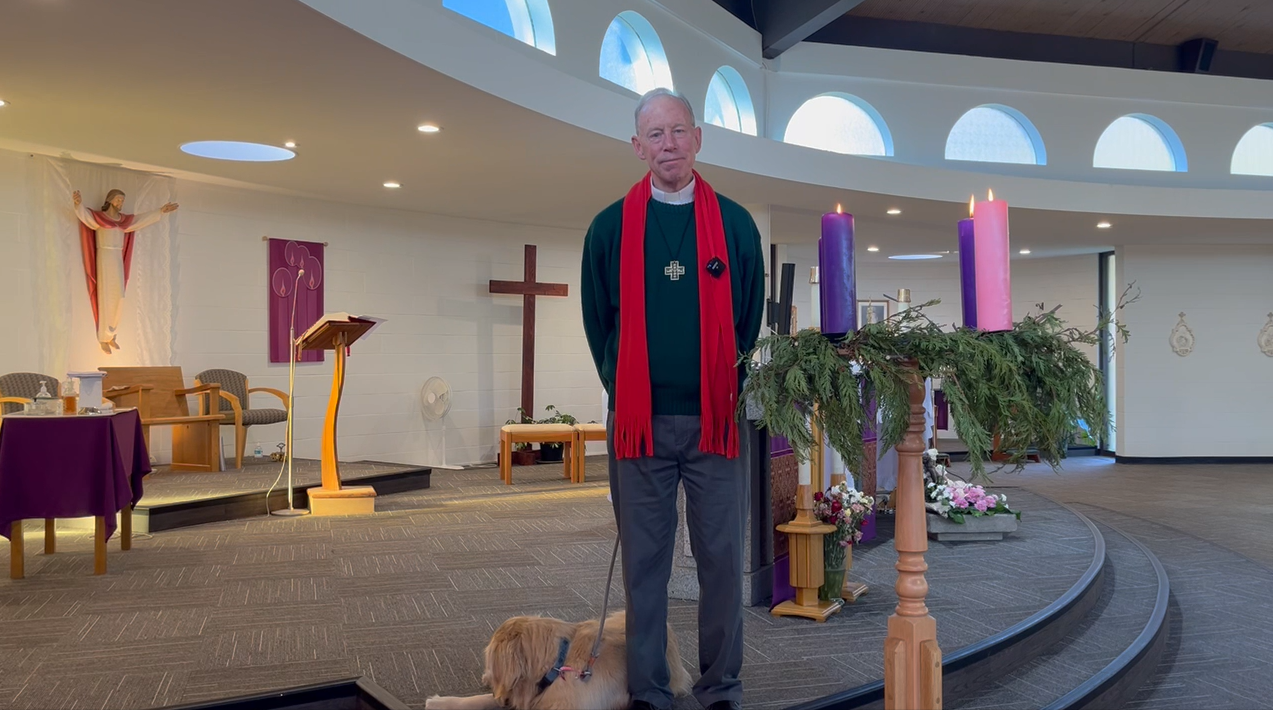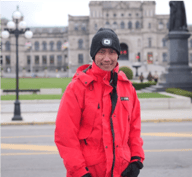 In late February, Karno Batiran, one of Development and Peace’s partners, came to the Diocese of Victoria to learn about and share information on sustainable farming. Karno is the CEO of a small non-profit organization in South Sulawesi, Indonesia, PAYOPAYO, that organizes young farmers to develop sustainable agriculture, alternative energy, appropriate technology, sustainable village resource management and sustainable livelihood solutions.
In late February, Karno Batiran, one of Development and Peace’s partners, came to the Diocese of Victoria to learn about and share information on sustainable farming. Karno is the CEO of a small non-profit organization in South Sulawesi, Indonesia, PAYOPAYO, that organizes young farmers to develop sustainable agriculture, alternative energy, appropriate technology, sustainable village resource management and sustainable livelihood solutions.
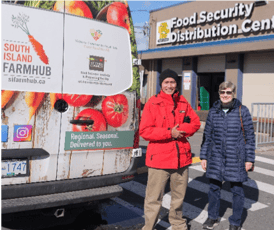 His first stop in Victoria on Feb. 26 was to meet with the South Island FarmHub that partners with 30+ regional farmers and 15+ food processors to make local food accessible to our community. It serves as a distribution hub connecting farmers with local charities feeding the vulnerable, restaurants and regional schools. Karno was interested in learning how the farmers are helping to build food security in our local region. He was very inspired that they created this aggregation & distribution hub. SIFarmHub also sells direct to customers. You can register online at sifarmhub.ca
His first stop in Victoria on Feb. 26 was to meet with the South Island FarmHub that partners with 30+ regional farmers and 15+ food processors to make local food accessible to our community. It serves as a distribution hub connecting farmers with local charities feeding the vulnerable, restaurants and regional schools. Karno was interested in learning how the farmers are helping to build food security in our local region. He was very inspired that they created this aggregation & distribution hub. SIFarmHub also sells direct to customers. You can register online at sifarmhub.ca
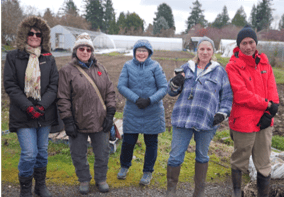 His second stop was to visit Haliburton Community Organic Farm on a bitterly cold morning Feb. 27, it even sprinkled snow for the tour. Our guide was Shellie MacDonald (in blue plaid jacket). There are 3 rented out farms, one uncultivated meadow, and a land mass to develop native plants and amphibians. Attached to the farmland is a nursery of native plants - a business on its own, called Satinflower Nursery. On the farm there is naturally held land that is to become an area of native food plants so that First Nations peoples can forage for food, as they did in the past. Some of the plants that are encouraged will be camas bulbs, wild garlic, huckleberries and salmonberries.
His second stop was to visit Haliburton Community Organic Farm on a bitterly cold morning Feb. 27, it even sprinkled snow for the tour. Our guide was Shellie MacDonald (in blue plaid jacket). There are 3 rented out farms, one uncultivated meadow, and a land mass to develop native plants and amphibians. Attached to the farmland is a nursery of native plants - a business on its own, called Satinflower Nursery. On the farm there is naturally held land that is to become an area of native food plants so that First Nations peoples can forage for food, as they did in the past. Some of the plants that are encouraged will be camas bulbs, wild garlic, huckleberries and salmonberries.
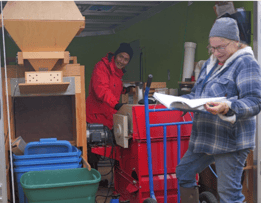 Shellie is showing Karno how the seed sorter machine works. The seed sorter is in a mobile unit that can go to any farm that hires it and sift out the seeds from the stems of collected plants. This way farmers don't need to bring their pulled seeds to the Haliburton Farm. Karno was fascinated as it is very important in sustainable agriculture to save seeds.
Shellie is showing Karno how the seed sorter machine works. The seed sorter is in a mobile unit that can go to any farm that hires it and sift out the seeds from the stems of collected plants. This way farmers don't need to bring their pulled seeds to the Haliburton Farm. Karno was fascinated as it is very important in sustainable agriculture to save seeds.
At Haliburton one of the farms is rented by a Japanese farmer cultivating Japanese-type vegetables. He has a solar heat generated greenhouse to start his plants. Another project at Haliburton is shallow ponds being dug to encourage the small, native frogs of the area to survive.
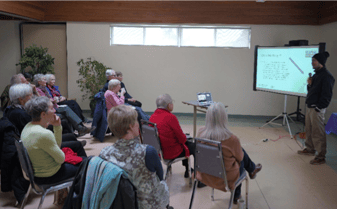 In the afternoon, Holy Cross Parish in Victoria hosted a presentation by Karno. Following the slide show Karno answered questions and the 25 attendees shared refreshments.We learned of their challenge to attract young people to farming as opposed to leaving for life in the city. They are having success teaching young women about sustainable, bio diverse methods of farming.It was especially affirming to hear him thank D & P for being one of their donors who did not make demands but allowed them the dignity of making decisions for themselves.
In the afternoon, Holy Cross Parish in Victoria hosted a presentation by Karno. Following the slide show Karno answered questions and the 25 attendees shared refreshments.We learned of their challenge to attract young people to farming as opposed to leaving for life in the city. They are having success teaching young women about sustainable, bio diverse methods of farming.It was especially affirming to hear him thank D & P for being one of their donors who did not make demands but allowed them the dignity of making decisions for themselves.
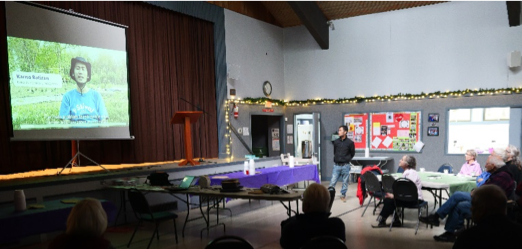 The next day Feb. 28, Karno with our Development and Peace animator, Jeremy Laurie, travelled to Ladysmith. Members of All Saints Catholic Parish (Ladysmith and Chemainus) had the opportunity to meet Karno and listen to a presentation about the PAYOPAYO Peasant School. Thirty plus parishioners attended to give a warm welcome to Karno. The conviviality of the gathering was enhanced by the homemade baking and refreshments shared. Karno’s presentation about the school, the benefits to the youth and the villages was well received. It was particularly gratifying to hear Karno’s appreciation for Development and Peace – Caritas Canada and the respectful collaborative relationship supporting PAYOPAYO.
The next day Feb. 28, Karno with our Development and Peace animator, Jeremy Laurie, travelled to Ladysmith. Members of All Saints Catholic Parish (Ladysmith and Chemainus) had the opportunity to meet Karno and listen to a presentation about the PAYOPAYO Peasant School. Thirty plus parishioners attended to give a warm welcome to Karno. The conviviality of the gathering was enhanced by the homemade baking and refreshments shared. Karno’s presentation about the school, the benefits to the youth and the villages was well received. It was particularly gratifying to hear Karno’s appreciation for Development and Peace – Caritas Canada and the respectful collaborative relationship supporting PAYOPAYO.
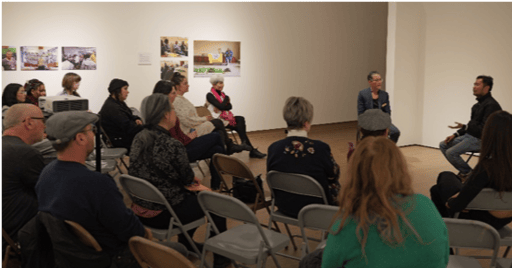 That afternoon, Karno visited Vancouver Island University in Nanaimo through the Global Engagement Program. About 25 students and staff attended his presentation. A good number of the students are taking the Global Studies program. He shared PAYOPAYO’s grassroots approach to helping empower people, especially young people, in the villages they work with.
That afternoon, Karno visited Vancouver Island University in Nanaimo through the Global Engagement Program. About 25 students and staff attended his presentation. A good number of the students are taking the Global Studies program. He shared PAYOPAYO’s grassroots approach to helping empower people, especially young people, in the villages they work with.
He explained how his program started out as a village organization, how they provided technical expertise to implement a village farming law, how they created their own development plan, did participatory mapping of the area, created a village database, and helped people prepare a budget that suited their needs. They promoted sustainable agriculture by working collectively. They also addressed climate change by undertaking organic farming, adaptive agriculture and involving young men and women. The participants appreciated Karno’s enthusiasm and his pride in and dedication to his work. His presentation seems to have motivated some students to consider working with groups like PAYOPAYO in future. Who knows, he just might have planted the seeds for these students to get involved in programs that transform the lives of the marginalized.
The Victoria Diocesan D&P members were very excited to host our partner from Indonesian and we both learned much from out mutual exchanges and were inspired to continue working towards sustainable agriculture. For more info on Development and Peace – Caritas Canada visit devp.org
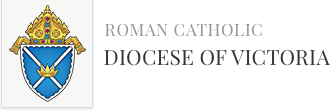
%20(1).png)
.png)
.png)
